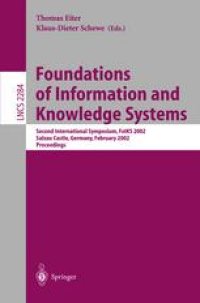
Ebook: Foundations of Information and Knowledge Systems: Second International Symposium, FoIKS 2002 Salzau Castle, Germany, February 20–23, 2002 Proceedings
- Tags: Database Management, Information Storage and Retrieval, Information Systems Applications (incl.Internet), Artificial Intelligence (incl. Robotics), Logics and Meanings of Programs
- Series: Lecture Notes in Computer Science 2284
- Year: 2002
- Publisher: Springer-Verlag Berlin Heidelberg
- Edition: 1
- Language: English
- pdf
This volume contains the papers presented at the “Second International S- posium on Foundations of Information and Knowledge Systems” (FoIKS 2002), which was held in Schloß Salzau, Germany from February 20th to 23rd, 2002. FoIKS is a biennial event focusing on theoretical foundations of information and knowledge systems. It aims to bring together researchers working on the theoretical foundations of information and knowledge systems and to attract researchers working in mathematical ?elds such as discrete mathematics, c- binatorics, logics, and ?nite model theory who are interested in applying their theories to research on database and knowledge base theory. FoIKS took up the tradition of the conference series “Mathematical Fundamentals of Database S- tems” (MFDBS) which enabled East-West collaboration in the ?eld of database theory. The ?rst FoIKS symposium was held in Burg, Spreewald (Germany) in 2000. Former MFDBS conferences were held in Dresden (Germany) in 1987, Visegr´ ad (Hungary) in 1989, and in Rostock (Germany) in 1991. Proceedings of these previous events were published by Springer-Verlag as volumes 305, 364, 495, and 1762 of the LNCS series. In addition the FoIKS symposium is intended to be a forum for intensive d- cussions. For this reason the time slot of long and short contributions is 60 and 30 minutes respectively, followed by 30 and 15 minutes for discussions, respectively. Furthermore, participants are asked in advance to prepare as correspondents to a contribution of another author. There are also special sessions for the pres- tation and discussion of open research problems.